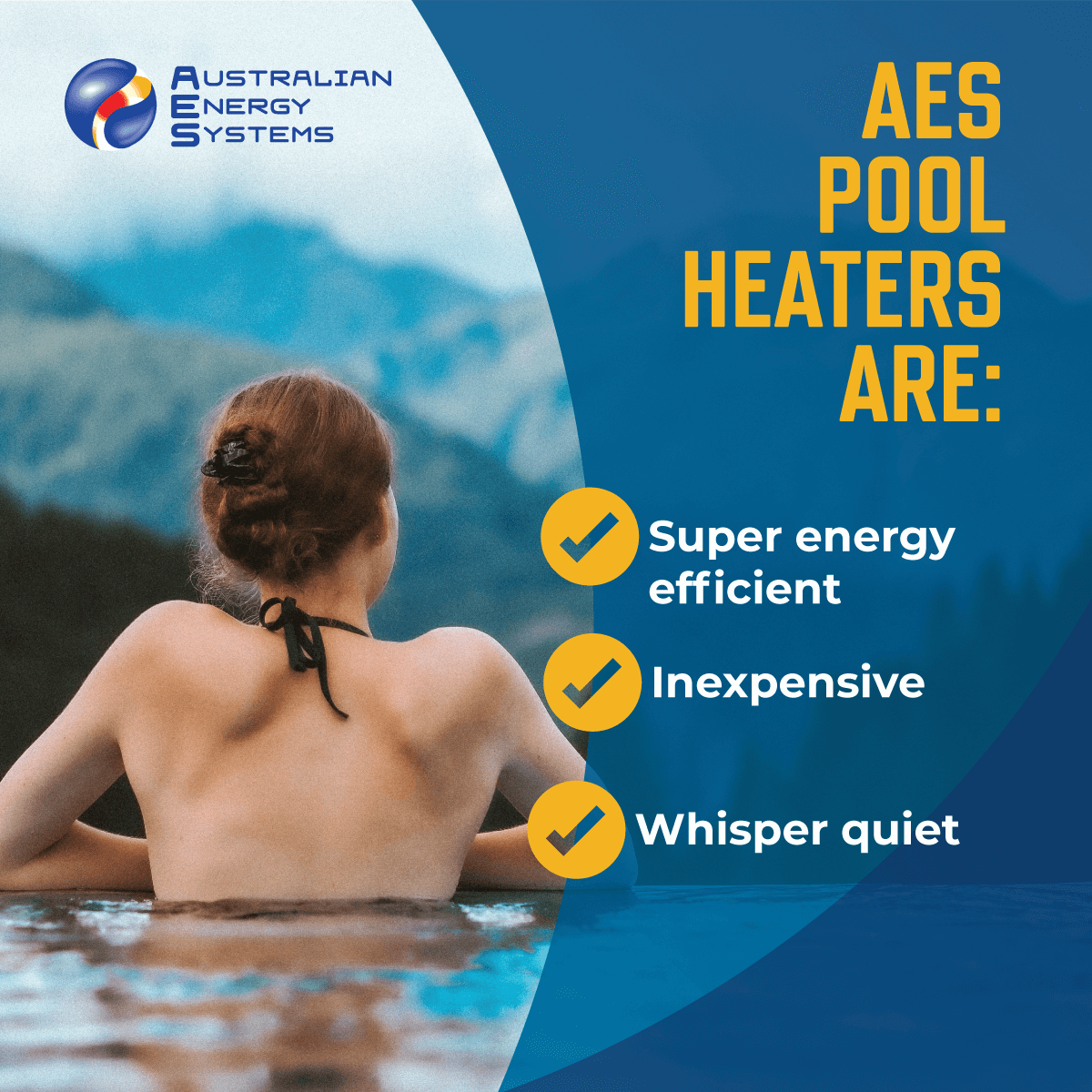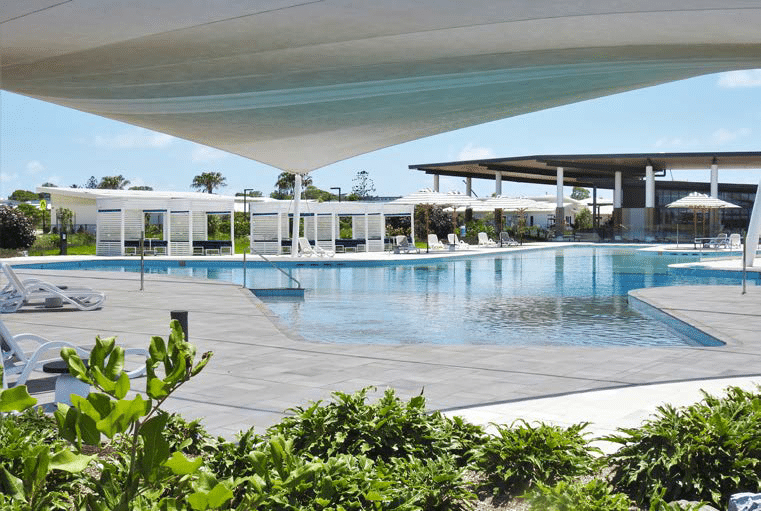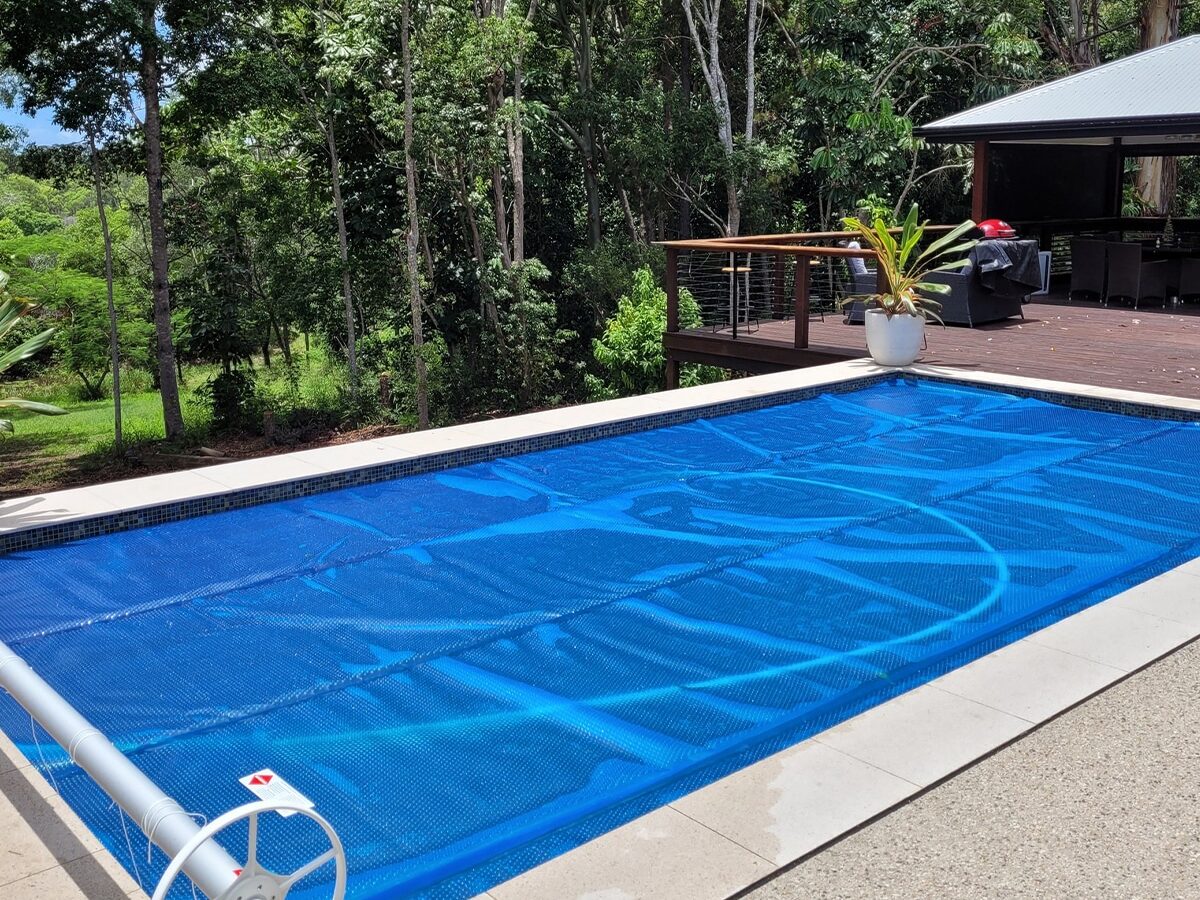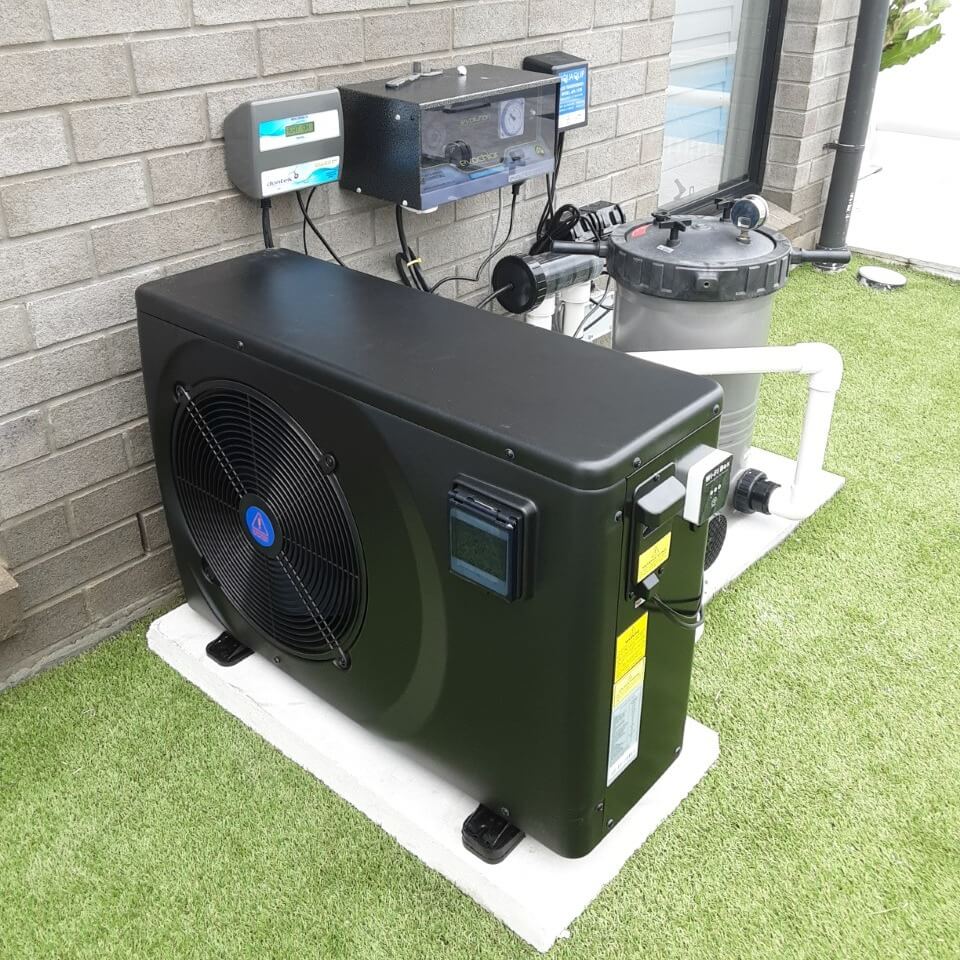Which pool heater is the best one for price? Energy efficiency? Lifestyle? We critiqued the most popular pool heating options in Australia and scored them out of 5 for the most important factors:
AES Pool Heating Tweet
Price: how much does the unit cost to buy upfront and install?
Energy efficiency: what are the ongoing costs of the unit and how does it compare?
Pool heat time: How long does it take to heat the average backyard pool?
Usability: does it heat the pool year-round or just extend your swim season?
We’ve also included tips on how the units work, and what to look for if you’re interested in using one.
Table of Contents
#1 - Overall winner: heat pump pool heaters
Price | Energy efficiency | Pool heat time | Usability |
5/5 | 5/5 | 4/5 | 5/5 |
An electric heat pump pool heater gets #1 place because it has the highest year-round convenience in comparison to its eco-friendly costs.
How it works: Electric heat pumps use electricity to draw pool water into the pump and over an evaporator coil, where it’s heated using liquid refrigerant before being passed onto a condenser and back into the pool.
Price: An inverter heat pump sits in the middle of the pool heater range. Depending on the size, you might pay around $3000 to $5000 or more for a unit. You’ll also need to pay installation costs which could be a few hundred dollars (any pool heater needs professional installation, and an electric heat pump is comparatively cheap and very fast to install).
Energy efficiency: A heat pumps cost very little to run because it uses ambient air to boost the heating power. It’ll be even cheaper if you live in a warm climate or have solar panels on your roof to help offset the electricity costs. It’s impossible to put a dollar figure on the ongoing running costs because of the constant changes in electricity prices, but you could be looking at approximately $500 to $800 per year without the help of solar.
Pool heat time: It takes between 12 and 48 hours to heat a pool with an electric heat pump pool heater, depending on the size, desired water temperature and how warm or cool the air is outside.
Usability: Yes, with an electric heat pump you’ll be able to swim year-round. And while it may be a little cheaper to run in warmer climates since it uses ambient air, location isn’t a factor and you’ll be able to swim in winter in Tasmania – if that’s what you want!
What to choose: Pool pumps can come in two models, either on/off pumps (which will switch off automatically when it hits the pre-set temperature and flick back on when the temperature drops) or inverter pumps that use smart technology to regulate the temperature dynamically. Inverter pumps are much better for ongoing costs as it doesn’t need to work as hard as the on/off version.
#2 – Best for cost efficiency: solar pool heating
Price | Energy efficiency | Pool heat time | Usability |
5/5 | 5/5 | 3/5 | 3/5 |
Solar pool heating is our #2 pick because you can’t beat its low cost and eco-friendliness, although it does have some limitations that keep it from being the #1 fan favourite with Australians.
How it works: Solar pool heaters use the sun’s energy to heat the pool water as it runs through a collector mat installed on the roof. The mat can be installed on tin or tile roofs and requires very little energy or cost to run.
Price: You’ll probably pay a little more for a solar pool heater upfront, because it requires more manpower to install. More factors come into play with the price because the size and position of your roof and its proximity to the pool will affect the final cost. It may cost as little as $2500, or more than $6000.
Energy efficiency: As far as energy goes, a solar pool heater is unmatched. It can cost virtually nothing to run (especially if it’s connected to a pool filter) or up to around $2 per day. These pool heaters are most effective in very sunny climates like Queensland where there’s simply more sunshine to harness.
Usability: This is where the solar pool heater is outperformed. Since it relies solely on sunshine, you won’t be able to swim year-round. You will, however, be able to add a few extra weeks to the swim season, and for such a cheap price, that may be all you want.
Pool heat time: It can take anywhere between a few days to a week to heat a pool with solar heating, depending on the weather. At a minimum, you’re probably looking at 3 days in a hot climate like Queensland.
What to choose: Look for high-quality materials that will withstand the hot Aussie sun. Some suppliers like Heliocol have excellent warranties. You’ll need expert advice on whether a solar pool heater will work for your backyard, so it’s best to get a free onsite inspection by a pool heating specialist.
#3 – Best for lifestyle: gas pool heating
Price | Energy efficiency | Pool heat time | Usability |
5/5 | 2/5 | 5/5 | 5/5 |
Why the bottom of the list if it’s so user-friendly? Gas pool heating warms your water super-fast and to high temperatures, and it’s reliable for year-round swimming – but you’re going to pay for it.
How it works: Gas heats your pool water on-demand in the same way gas heating works for home use; using copper coils that are heated ultra-fast with LPG gas.
Price: Gas pool heaters are often a little cheaper than solar or electric pool heaters. You could be looking at around $3000 for a unit, plus installation costs. Comparatively, you could possibly pay half for a gas heater than you would for solar, but the biggest difference is the daily cost.
Energy efficiency: The ongoing costs are the gas heater’s biggest flaw. There used to be a day when it was competitive against electric pool pumps, but the rising prices of LPG have made this the most expensive way to heat your pool today. An average 32m2 pool heated for 7 months per year could cost upwards of $1200 to run.
Pool heat time: The heating time makes gas a contender in the Top 3 pool heaters, regardless of ongoing costs. It’s possible to heat a pool in as little as 4 hours, making gas a good option if you want to decide to swim in winter and hop in that night.
Usability: The functionality of a gas heater is top-notch, because it will heat your pool year-round, to high temperatures and as speedily as you could ask for. Basically, use a gas heater if you’re after fast, reliable pool heating and don’t mind paying extra for the convenience.
What to choose: The bigger the system, the faster it will be able to heat the water. Get an expert to help you size up the unit in comparison to how you want to use your pool (year-round, just for a few extra months, or sporadically when the mood hits).
Making sure you get the right heater for the job
When choosing a pool heater, it does help to do some research and compare the most popular pool heaters to find one that will suit your backyard and the way you want to live.









